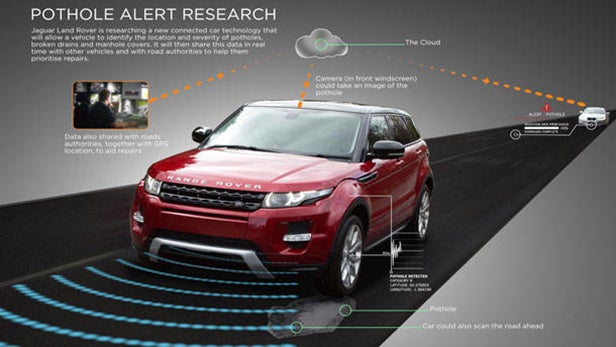Future Range Rovers will provide pothole warnings

Jaguar Land Rover is working on a Range Rover that could make driving on roads much more pleasant for everybody.
That’s because this particular concept car has the ability to spot potholes, and then report the location to the council.
This means that the cesspit of bureaucracy that is your local authority might actually get around to sorting out the roads. Just maybe.
So how does it work? The system is built in conjunction with the Magneride suspension that already appears on the Evoque and the Discovery Sport.
A computer then records the severity of impact over potholes, as well as broken drains and manhole covers.
This data is then transmitted in real-time to other vehicles, and the local road authority.
“At the moment,
Bell continued: “So we are also researching how we could improve the measurement and accuracy of pothole detection by scanning the road ahead, so the car could predict how severe they are before the vehicle gets near them.”
Related: Project Cars review
It’s useful for other vehicles to be aware of upcoming potholes, as prior knowledge could help avoid an expensive trip to the mechanic. Warning of more serious potholes could even help prevent road accidents.
“Ultimately, sensing the road ahead and assessing hazards is a key building block on our journey to autonomous car,” explained Bell. “In the future, we are looking to develop systems that could automatically guide a car around potholes without the car leaving its lane and causing a danger to other drivers.”
He added: “If the pothole hazard was significant enough,
Jaguar Land Rover is currently in talks with Coventry City Council to determine how best to share road data with the authorities.
Rachel Lancaster, Councillor at Coventry City Council, said: “As part of our ‘Smart Cities’ strategy, we will be investigating how Jaguar Land Rover’s Pothole Alert system could supply us with data in real-time from thousands of connected cars right across our network.”
She noted that improving maintenance programmes using the system “would save the taxpayer money.”


